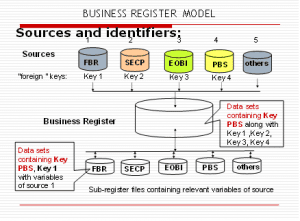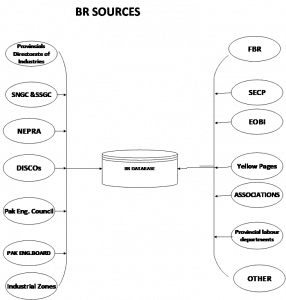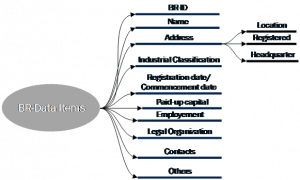Business Register
BR Model
Strategy
Business Register
Business Register
The aim of BR is to develop a sustainable central repository of information on businesses in Pakistan, having a data base of different enterprises and establishment together with their contacts and classification information.
From inside out, it provides business frames, data collection support, monitoring response burden and from outside in, it serves as linking tool with administrative sources. It ensures fully updated and classified business frames concurrent to international standard.
BR is mainly based on records from different administrative sources in the country. In Pakistan, the BR depends upon censored data sources, where different sources have weak linkages of sharing and coordination. Utilizing the administrative records to develop a sustainable central repository of information on businesses in Pakistan, having a computer based database system of different business enterprises and establishments will certainly provide sound base for erecting quality frames of different sectors of the economy. The Development of Business Register, based mainly on administrative sources, started from January 2010.
Background /Legal basis of BR
The Prime Minister of Pakistan constituted a committee to install Business Register in Pakistan in 2006 keeping in view the usefulness, reliability, coverage and availability of the statistics produced within the Official Statistics System. The Committee constituted three Sub-Committees on technical & statistical aspects, workflow and data processing, and legal aspects to deliberate and recommend methods and framework for establishing BR in Pakistan. The Committee its recommendations in December 2007 and proposed to launch project to develop the Business Register.
The Committee recommend that PBS would be responsible to promote, install and run the Business Register in Pakistan and BR should be developed in a centralized structure. The Committee also recommended that initially BR should developed for manufacturing industries on administrative records of FBR, SECP, Pakistan Stock Exchange, SNGC, SSGC and provincial labour and Industrial departments.
There is no need to have special law for BR as The General Statistics (Reorganization) Act, 2011 empower PBS to collect data and have right to access records and documents that are maintained in a Govt. department, business or in any office, public or private under article-25(2) of the Act.
Services/function of BR
The primary functions of the BR Section are outlined as follows:
- Incorporation of New Enterprises/Establishments or Variables:
Add new enterprises /establishments, along with their associated variables, to the BR database upon receiving data from relevant stakeholders.
2. Sample Selection for Surveys:
Select samples for surveys conducted by the Pakistan Bureau of Statistics (PBS) or other national and international organizations.
3. Conduction of Census/Surveys:
Conduct census and surveys of establishments across diverse fields as assigned by the PBS and other national and international organizations.
- Technical support
Providing technical support to other organizations related to conducting enterprises/establishments surveys
Censuses/survey conducted by BR Section
- Management and Organizational Practices Survey (2010-11)
- Censuses of Manufacturing Industries (CMI-2015-16
- Management and Organizational Practices Survey (2015-16)
- Price and Wage Setting Behavior Survey (2019)
- Preparation of sample design and Sample list for World Bank Enterprise Survey and State Bank of Pakistan.
- Technical support to related establishments survey to other organizations etc. g World Bank Enterprise Survey by World Bank, MOPS, PWSBS by State Bank of Pakistan (SBP). First Industrial National Innovation Survey (FINIS) by Pakistan Council for Science and Technology (PCST) etc.
Contact Information
Address: Pakistan Bureau of Statistics,
First Floor, Statistics House,
21 Mauve Area, G-9/1, Islamabad, Pakistan
Phone: +92 51 9106577, 9106550
Email: bjan@pbos.gov.pk, bahrawarjan@yahoo.com, anwar.cso@pbos.gov.pk, mhanwar22@yahoo.com
BR Model
BR Model

The source agencies is required to supply updated soft copies of data files on predetermined dates on annual basis or monthly base.
BR Sources

Data Items in PK-SBR

Strategy
Updating Strategy
- Through Censuses and surveys
Pakistan Bureau of Statistics (PBS) conducts a comprehensive range of census and surveys under an umbrella of rebasing the National Accounts from time to time. Additionally, the Bureau conducts ad-hoc surveys as per requests from various departments/organizations such as the State Bank of Pakistan (SBP), World Bank, International Monetary Fund (IMF), among others.
Among the noteworthy surveys and censuses conducted by PBS are the Census of Manufacturing Industries (CMI), Construction Survey, Census of Mining and Quarrying, and the Survey on Hotel and Restaurants etc. In the realm of ad-hoc surveys, the most prominent survey conducted by Business Register (BR) section are the Management and Organizational Practices Survey, World Bank Enterprise Survey, and the Price and Wage Setting Behaviour Survey. These surveys are pivotal in gathering vital information for economic analysis and policy formulation.
For updating the BR, for instance, the BR section developed a frame comprising over 40,000 records for Census of Manufacturing Industries 2015-16, sourced from various administrative channels. During the field operations of CMI 2015-16, stakeholders were instructed to distribute CMI forms to all industries listed in the BR and to those not initially included in the Business Register. As part of this process, existing BR addresses were verified, and new industries that were not part of the BR list were incorporated into the BR database. Furthermore, the BR is regularly updated with information obtained from various ad-hoc surveys, ensuring that the data remains current and reflective of the dynamic business landscape. For example, a sample list is disseminated to the Regional and Field Offices of PBS. Through collaboration and data exchange with these offices, the Business Register is continuously enriched and refined, ensuring its relevance and accuracy in supporting the diverse array of surveys and censuses conducted by PBS.
- Through administrative sources
Business registration is diverse in Pakistan. PBS collects information from the administrative data sources used for statistical Business Register. The data in administrative sources like FBR, SECP, DISCOs, KESC, SNGC, SSGC, Provincial Welfare and Industrial Departments have generally been collected for a specific administrative purpose, and the needs and priorities relating to that purpose are likely to be different to those of the statistical system. Different sources have different aims and objectives for registration of enterprises and establishments. E.g. SECP is company registration authority in Pakistan, FBR is tax collection authority, Employees Old Age Benefit Institution (EOBI) registered employer and employees for insurance purposes. Labour department register factories for labour welfare purposes. Engineering Council maintain database for constructor and operators, SSGC, SNGPL provides gas and DISCO distribute electricity industrial, commercial and household customers. Data integration in BR of all business directories maintained by these different administrative sources are not so easy. PBS is starving hard to come up with comprehensive, un-duplicated and up-to-date business register in Pakistan.
PBS gets list of records from various administrative sources. Further, the existing data from administrative sources undergoes a rigorous review process, leading to updates and refinements of records. Records are updated after extensive review of existing data of an administrative source. Additional/new records are incorporated into the system and these new entries enhance the comprehensiveness of the database, ensuring that it remains up-to-date.
Censuses/survey
- Management and Organizational Practices Survey (2010-11)
- Censuses of Manufacturing Industries (CMI-2015-16
- Management and Organizational Practices Survey (2015-16)
- Price and Wage Setting Behavior Survey (2019)
- Preparation of sample design and Sample list for World Bank Enterprise Survey and State Bank of Pakistan
- Technical support to related establishments survey to other organizations etc. e.g World Bank Enterprise Survey by World Bank, MOPS, PWSBS by State Bank of Pakistan (SBP). First Industrial National Innovation Survey (FINIS) by Pakistan Council for Science and Technology (PCST) etc
Tables
Reports
- Report of BR Section
metadata
Definition

